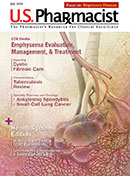Tepotinib is an oral mesenchymal-epithelial transition (MET) inhibitor that is designed to inhibit the oncogenic MET receptor signaling caused by MET (gene) alterations. Tepotinib was granted Priority Review and is being reviewed by the FDA under its Real-Time Oncology Review pilot program, which is designed to generate a more efficient review process to bring safe and effective treatments to patients as early as possible.
Tepotinib was given Breakthrough Therapy Designation by the FDA in September 2019 for the treatment of patients with metastatic NSCLC harboring METex14 skipping alterations who progressed following platinum-based cancer therapy. Acceptance of the application was based on the phase II VISION study, a pivotal, multicenter, multicohort, single-arm, open-label study evaluating tepotinib as monotherapy in patients with advanced NSCLC with METex14 skipping alterations prospectively evaluated by liquid and/or tissue biopsy. The primary outcome measure is objective response measured by an independent review committee and according to Response Evaluation Criteria in Solid Tumors. Secondary outcome measures include objective response, duration of response, objective disease control, progression-free survival, overall survival, and other measures.
The trial is ongoing and continues to enroll patients. Results reveal consistent response rate and durable antitumor activity across lines of treatment, including in patients with brain metastases and in those patients evaluated by both liquid biopsy and tissue biopsy. Data from the primary analysis of the VISION study were published in The New England Journal of Medicine on May 29, 2020 and presented during the American Society of Clinical Oncology (ASCO) ASCO20 Virtual Scientific Program. Additionally, tepotinib is also being studied in the phase II INSIGHT 2 study in combination with osimertinib in MET-amplified, advanced, or metastatic NSCLC harboring activating estimated glomerular filtration rate mutations that has evolved following first-line treatment with osimertinib.
In a statement from the manufacturer it was noted that, “METex14 skipping alterations drive a particularly aggressive form of NSCLC in a patient population that is generally elderly, facing poor clinical prognosis and in urgent need of new therapeutic options. With this acceptance and review under the RTOR program, we look forward to working with FDA and to making this precision medicine available to patients in the U.S. as soon as possible.”
« Click here to return to Lung Cancer Update.






